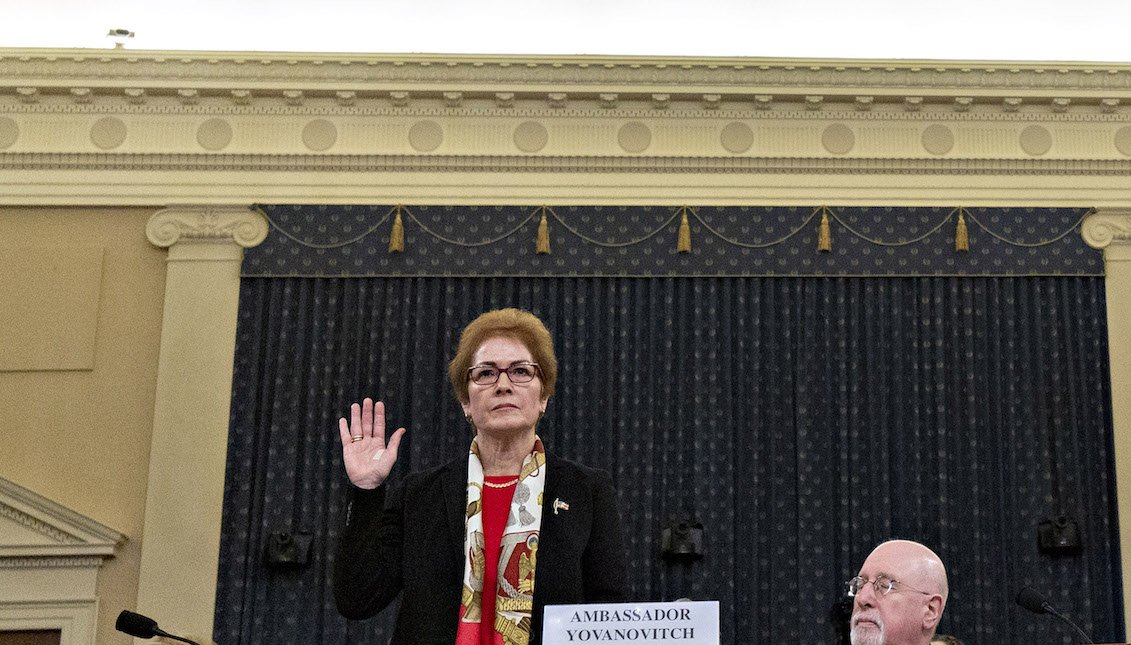
How Trump helped with Marie Yovanovitch's testimony
The deposition of the former U.S. ambassador to Ukraine was compromising enough for the president when he decided to make things worse.
The second session of testimonies in the public impeachment against Donald Trump had a protagonist, but many involved.
Former U.S. ambassador to Ukraine, Marie "Masha" Yovanovitch - a diplomat with more than 30 years of experience in the country's foreign service - declared and responded to legislators on the House Intelligence Committee about her abrupt firing earlier this year.
Since Yovanovitch arrived at the embassy in Ukraine in May 2016, she made a name within the international diplomatic community as a staunch fighter against the corruption that flooded the country, setting the tone for U.S. positions in the former Soviet region.
Not surprisingly, in a country undermined by elitist corruption allied to Moscow, Yovanovitch quickly made a handful of enemies.
After the Revolution of Dignity in Ukraine during much of 2014, the Ukranian people made clear their willingness to break with the "legacy of corruption" inherited from Russia and to be part of Europe. The role of the U.S. ambassador to the country was precisely to demonstrate U.S. support for that process.
"Corrupt leaders are inherently less trustworthy, while an honest and accountable Ukrainian leadership makes a U.S.-Ukrainian partnership more reliable and more valuable to the United States," Yovanovitch said during her opening statement.
However, as the evidence seems to indicate, in the Trump era, corruption is open for debate.
During the controversial phone call between President Donald Trump and Ukrainian President Volodymyr Zelensky, Trump referred to Yovanovitch as "the former ambassador from the United States, the woman," and explained to Zelensky that she was "bad news," as well as "the people she was dealing with in Ukraine.”
Trump was echoing a smear campaign that Yovanovitch was subjected to during the last few months in office and that was orchestrated by the president's personal lawyer, Rudy Giuliani, conservative media and then-Ukrainian prosecutor Yuri Lutsenko.
The narrative was that the ambassador "was not loyal" to Trump and that she would be talking badly about the president behind his back, something fervently refuted by colleagues and people close to her professional career.
However, Giuliani's ploy went so far as to imply that Yovanovich would be obstructing, in one way or another, investigations in Ukraine against Democratic candidate and former vice president Joe Biden – the reason the whole impeachment began in the first place.
According to the New York Times, a former Ukrainian prosecutor said in an interview that "Mrs. Yovanovitch had blocked his team from getting visas to the United States to deliver damaging information about Mr. Biden and his son Hunter to the FBI.”
None of these allegations have been substantiated.
RELATED CONTENT
What is clear is that Yovanovitch's only "disloyalty" was her intransigence in the face of corruption.
This cost her not only a smeared reputation and getting fired, but also to be the focus of threats by the president himself, who during the deposition of the ambassador before the Committee wrote on Twitter:
"Everywhere Marie Yovanovitch went turned bad. She started off in Somalia, how did that go? Then fast forward to Ukraine, where the new Ukrainian President spoke unfavorably about her in my second phone call with him. It is a U.S. President’s absolute right to appoint ambassadors.”
Everywhere Marie Yovanovitch went turned bad. She started off in Somalia, how did that go? Then fast forward to Ukraine, where the new Ukrainian President spoke unfavorably about her in my second phone call with him. It is a U.S. President’s absolute right to appoint ambassadors.
— Donald J. Trump (@realDonaldTrump) November 15, 2019
While it is true what the president said about his right to appoint ambassadors, nothing justified the plot against Yovanovitch, who confirmed to the chairman of the committee, Adam Schiff, that "it is very intimidating.”
"I can't speak to what the president is trying to do, but I think the effect is to be intimidating," she added.
Simultaneously, a court found the president's informal advisor and close friend Roger Stone, guilty on seven counts, one of which was, precisely, witness intimidation.
And the president's tweet could easily be an impeachment article against him.
As Schiff told Yovanovitch, "some of us here take witness intimidation very, very seriously.”











LEAVE A COMMENT: